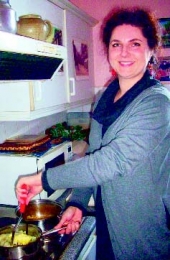Rose Foley meets one of a growing number of immigrants who provide home care in Ireland
 Barbara and Winnie have a special relationship that goes beyond the usual employee-employer bond.
Barbara and Winnie have a special relationship that goes beyond the usual employee-employer bond.
That’s because Barbara, a Polish immigrant who moved to Ireland several years ago, works as a home carer two days a week for Winnie, an Irishwoman in her 70s who’s confined to a wheelchair.
“It takes time to know each other,” Barbara explains while roasting a chicken one evening at Winnie’s home in south Dublin. “It’s very personal work. Day after day, month after month, the relationship is built.
“Everything is about the building of a relationship. On this type of job, your contact is very close. You do not have this kind of privacy.”
Barbara, 38, is just one of a number of immigrants in Ireland who take care of Irish people like Winnie – many of them older adults – who require home care.
According to a report published in September 2009, the proportion of migrant workers caring for Irish older people has increased significantly in recent years.
The report, by Dr Kieran Walsh and Prof Eamon O’Shea of NUI Galway, acknowledges that migrant workers and older people are often considered to be marginalised sections of the population.
“While the economic decline may exert downward pressure on the demand and supply of foreign national carers in the short term, migrant carers will continue to be a feature of older adult care in Ireland in both the medium and longer term,” it states.
The report determines that Poland is the primary source country for care assistants in Ireland.
Barbara’s work with Winnie starts at 4pm and runs till 11am the next day. She helps Winnie get up in the morning and assists with personal care, cleaning, cooking and washing clothes and linens. The rest of the week, Winnie’s other carers – who are from Ireland as well as other countries including Zimbabwe, Nigeria and Spain – take their turns.
The closeness involved in this line of work has both positive and negative consequences. For example, the death two years ago of another Dublin woman that Barbara looked after was almost too much for her to bear.
“After that I said no, I have to change my job,” she says. “I have to change something in my life. From another point of view, I say, ‘You cannot give up. You are not the type of person who works with computers. You want to help others.’ So I did more relief work and met beautiful people, like Winnie, who gave me strength.”
Barbara, who has a teenage daughter, didn’t set out to be a home-care worker in Ireland. She first travelled here for a month-long holiday some years ago to recover from the death of her husband in a car accident. She ended up falling in love with an Irishman, an artist named Adam.
After returning to Poland for six months, she came back to Ireland to live here and build her relationship with her new partner. She also started classes to improve her English, attending classes daily for 18 months.
“At the same time, I worked in a café from 3pm to 10pm,” she says. “So it was a very, very hard time, but it was worth it.”
Her job caring for Winnie started out as a temporary position, but has become more permanent, and she appreciates everything that it’s done for her.
“I am so, so pleased to be here because the country gave me not just money, but a new chance at life,” she said.
Barbara also notes a similarity between Poland and Ireland beyond the Catholic foundations.
“For many years, we weren’t independent and now we are – and it’s the same in Ireland, ” she says. “So we know what it is to fight, how to fight, and how to be poor and how to grow.”











